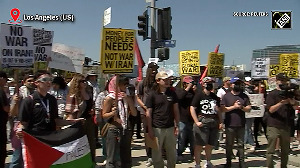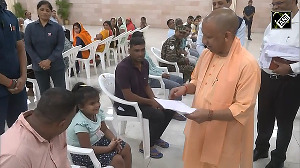President Barack Obama dispatched three of his top officials, including Secretary of State Hillary Clinton and Defence Secretary Robert Gates, to the Capital Hill to make a convincing case for a Congressional ratification of the New STRAT treaty with Russia that proposes to reduces the nuclear stockpiles of the nations by one-third.
Arguing that the new START treaty will make the United States more secure, Clinton said this treaty also reflects America's growing cooperation with Russia on matters of mutual interest, and it will aid them in advancing their broader nonproliferation agenda.
"Some may argue that we don't need a new START treaty. But the choice before us is between this treaty and no treaty governing our nuclear-security relationship with Russia, between this treaty and no agreed verification mechanism on Russia's strategic nuclear forces, between this treaty and no legal obligation for Russia to maintain its strategic nuclear forces below an agreed level," she said. It is a treaty that, if ratified, will provide stability, transparency and predictability for the two nations with more than 90 per cent of the world's nuclear weapons, she said, adding that by bringing the new START treaty into force, "we will strengthen our national security more broadly, including by creating greater leverage" to tackle a core national security challenge, nuclear proliferation.
Gates said this treaty reduces the strategic nuclear forces of the two nations in a manner that strengthens the strategic stability of their relationship and protects the security of the American people and their allies. "America's nuclear arsenal remains a vital pillar of our national security, deterring potential adversaries and reassuring allies and partners," he said. "Under this treaty, we retain the power to determine the composition of our force structure, allowing the United States complete flexibility to deploy, maintain and modernise our strategic nuclear forces in a manner that best protects our national-security interests," Gates said.
"The chiefs and I believe the new START treaty achieves important and necessary balance between three critical aims. It allows us to retain a strong and flexible American nuclear deterrent. It strengthens openness and transparency in our relationship with Russia. It also demonstrates our national commitment to reducing the worldwide risk of nuclear incidents resulting from the continuing proliferation of nuclear weapons," Chairman of the Joint Chiefs of Staff Admiral Mike Mullen said.
Chairman of the Senate Foreign Relations Committee Senator John Kerry said the New START significantly reduces the number of warheads, missiles and launchers that the US and Russia can deploy, eliminating surplus Cold War armaments as they turn to face the threats of the 21st century. The implications of this treaty extend far beyond US-Russian relations, he said, prominent among these include, Afghanistan and Iran.
"Today, far more than in recent years, those nations are rallying behind the United States and its efforts to lessen the nuclear threat. New START has already helped us to isolate Iran and deflect its efforts to cast the United States as the threat to the NPT," he said. "I firmly believe that the central limits establishing this treaty and the provision that allows each side the freedom to determine its own force mix provides us with the necessary flexibility to field the right force structure to meet the nation's needs," Mullen said.
"We plan to retain our triad of bombers, ballistic- missile submarines and land-based intercontinental ballistic missiles in sufficient diversity and numbers to assure strategic stability between ourselves and the Russian Federation. We will also maintain sufficient capability to deter other nuclear states," Mullen said









